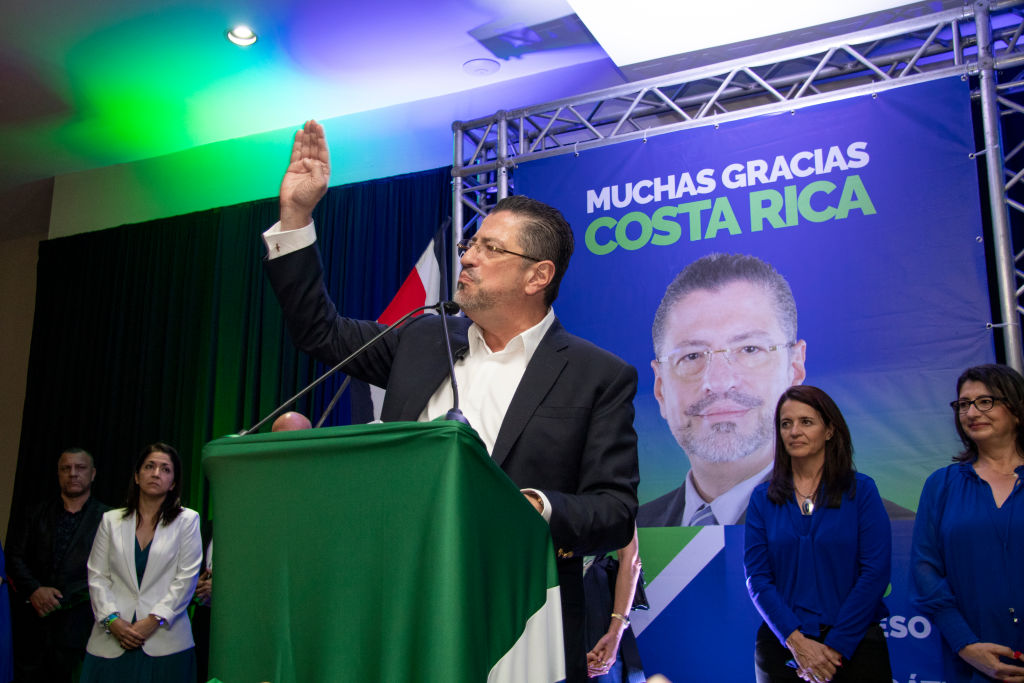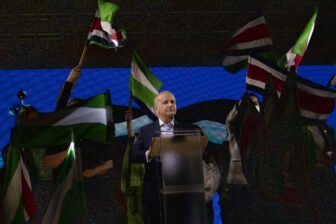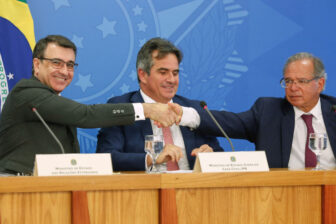The election of former finance minister Rodrigo Chaves in Costa Rica’s presidential runoff on April 3 demonstrated that Costa Rica, one of Latin America’s most robust democracies, is not free of the anti-system tendencies seen elsewhere in the region.
But it also laid bare a deep social divide and simmering discontent in the “other” Costa Rica—rural and peripheral areas where state intervention has a weaker presence and poverty and inequality remain high. Without a majority in Congress, Chaves will need to build a coalition to follow his campaign promises to reduce the size of the state and fight the country’s “corrupted elites.”
Chaves, an ex-World Bank economist who briefly held the finance ministry in the outgoing government, won 52.9% of the vote on Sunday, defeating José María Figueres by a margin of 5%. Figueres, the frontrunner in February’s runoff, was president from 1994 to 1998 and represented the centrist and traditional democratic National Liberation Party (PLN).
Chaves has proposed to reduce the size of the state, remove obstacles for entrepreneurs, reactivate economic growth, and reduce unemployment. The major differences between both candidates wasn’t their programs but rather their strategies: the experienced Figueres offered stability in volatile times, while the anti-establishment Chaves promised to shake up the political and economic structures of privilege and fight against what he calls “corrupted elites.”
But there was also a meaningful difference in how much the candidates committed to playing by democratic rules. Chaves ran with explicit intentions to govern by referendum and decree in order to circumvent Congress’ involvement in approving executive proposals, claiming this would speed up the decision-making process, while also attacking and confronting the media and political institutions.
Crucial policy-making decisions lie ahead in a post-pandemic context, but Chaves’ government will have limited power in Congress given the small number of seats his party secured in the legislative election (10 of 57). This will force him to build a working majority out of the other five parties to guarantee governability and the approval of his policies. Chaves’ party, like Figueres’ PLN, did not build electoral alliances on the way to the runoff given the unwillingness of opposition parties to risk their political capital on not-so-popular presidential candidates.
Costa Rica’s executive branch has some of the weakest institutional powers over the legislative process in Latin America. That fact, along with the lack of a legislative majority, will probably pose the same difficulties faced by many of Costa Rica’s recent presidents since the traditional two-party system disappeared in 2006 and a fragmented Congress became the norm. Only an average of two out of 10 laws approved by the Legislative Assembly in the past few years have emerged from executive initiatives.
The consequences of an unequal recovery
Costa Rica, now an OECD member, is currently showing signs of economic recovery after the pandemic—but the recovery has been highly uneven between sectors and regions. The country is also struggling with elevated levels of poverty (26%) and unemployment (14.4%) affecting mainly women and youth, pressing public debt, and an unpopular $1.8 billion loan agreement with the IMF negotiated by the outgoing government. The COVID-19 pandemic aggravated already pronounced inequality, exacerbating structural problems in the country’s periphery.
These challenges call for Chaves to implement immediate productive, fiscal, and employment reforms that accelerate economic growth—while correcting wealth distribution imbalances that risk undoing the country’s 40-year achievement in human development indicators. But Chaves lacks a policy-making team due to how recently his party was created.
Another challenge is that Chaves’ initial legitimacy could quickly evaporate. His honeymoon period could be short or practically nonexistent, as a major source of his support was rejection of Figueres rather than the appeal of his own candidacy. His popularity might also be affected by the burden of fiscal commitments inherited from the outgoing government and rising cost of living and fuel prices facing many countries as a result of international supply chain problems and Russia’s invasion of Ukraine.
The hotly contested runoff exacerbated voters’ disaffection with political parties and candidates. A few days before the election, 73% of people said they did not identify with the candidates, but the problem goes even deeper. Although Costa Ricans support democracy, studies show citizens are highly discontent with political parties and institutions. Today 90% of Costa Ricans do not identify with any particular party, while 89% believe that leaders govern on behalf of powerful groups and to benefit themselves. It’s not difficult to understand the increase of abstentionism the counry has seen since 1994, with the runoff registering an all-time record of 43%.
During the runoff campaign, both candidates traded accusations of corruption. There were several investigations of Chaves and his party for alleged parallel structures of campaign financing with donations and expenses not reported to the Electoral Supreme Tribunal. Chaves was demoted by the World Bank, his former employer, for sexually harassing six employees when he worked there. However, none of those investigations and sanctions posed an obstacle for his election.
But it isn’t just distrust of politicians that is causing dissatisfaction: It’s also the fact that Costa Rica is practically two countries in one. There’s the prosperous, urban, high-tech Costa Rica that benefits from the central government’s policies, fiscal exemptions and interactions with the global market—but there’s also the forgotten Costa Rica of the periphery where higher levels of poverty and inequality concentrate and where state institutions deliver less. It is precisely in those areas where abstentionism has been particularly high, and where voters support anti-system leaders like Chaves, as well as Fabricio Alvarado in the 2018 election. The new government must urgently prioritize this “other” Costa Rica if it wants to preserve the country’s levels of human development and the health of its democratic system.
—
Benavides-Santos is a political scientist, researcher and international consultant. She is an affiliated researcher at Columbia University.






